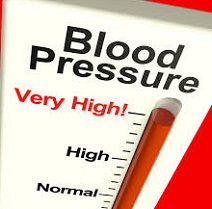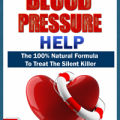![]()
 High blood pressure a.k.a. hypertension is defined as high pressure within the arteries. Arteries are the veins that carry blood to the rest of the body from the heart. The reading for blood pressure is given in two numbers. The systolic pressure or the top digit equals the pressure in the arteries when the heart contracts.
High blood pressure a.k.a. hypertension is defined as high pressure within the arteries. Arteries are the veins that carry blood to the rest of the body from the heart. The reading for blood pressure is given in two numbers. The systolic pressure or the top digit equals the pressure in the arteries when the heart contracts.
The diastolic pressure or the bottom digit is the pressure in the arteries when the as the heart relaxes. The normal blood pressure level is 120/80. If the pressure is between 120/80 and 139/89, it is referred to as pre-hypertension. If the pressure goes above 140/90, it is considered high blood pressure or hypertension.
There are many complications of high blood pressure such as heart attacks, kidney failures, eye damage and the hardening of arteries. This is why you need to keep your pressure at normal levels at all times. This article provides a comprehensive overview of the main causes of high blood pressure.
Hypertension is a major sickness in the United States where one in every three people is suffering from the condition. This is about 74.4 million people in the U.S. alone. There are numerous causes that can result in high blood pressure.
Salt sensitivity or high salt intake is one of the major causes for hypertension. This usually occurs in a certain population such as the elderly African Americans, people who are overweight and patients suffering from kidney problems. People, who have one or two parents suffering from this condition, are twice as much as more prone to the disease compared to the general public.
Also, people who are having a particular abnormality in their arteries can suffer from this condition. This abnormality will result in a lack of elasticity in the arteries. This will increase the peripheral arteriolar stiffness, which make such people more prone to the disease. There are some people who suffer from high blood pressure due to one or more of the following conditions.
These conditions tend to cause sudden hypertension, which is called secondary hypertension. Here are some of the most common conditions that can result in secondary hypertension.
Some of the most common conditions include obstructive sleep apnea, adrenalin gland tumors, kidney failures, thyroid problems, illegal drugs like cocaine and amphetamines, alcohol abuse, certain medications such as birth control pills, decongestions, cold remedies, over the counter pain killers and many other prescription drugs. There are many risk factors for hypertension. Some of the major factors include age, race, obesity, family history, using tobacco and alcohol, being physically inactive, too much salt and too little potassium in the diet and stress.
The risk of high blood pressure increases as you age. Hypertension is more common in men and women who are over 45-years old. Sometimes, women develop the condition only after 65-years of age. The condition is more common among the African American population. It tends to run in families and more common in people with a family history of high blood pressure. The more your weight is, the more blood is required to supply oxygen and nutrients to the tissues. Once the volume of blood circulated increases, so does the pressure of the walls of the arteries.
People who are not that active tend to have a higher heart rate. The higher your heart rate is, the harder your heart has to work to pump blood to the other parts of your body. This is another reason for the increased risk of hypertension. Smoking or chewing tobacco will immediately raise your blood pressure levels.
Chemicals in tobacco can damage the linings of your artery walls. Arteries can narrow as a result. It will help increase your blood pressure. When there is too much of salt in your diet, it can retain fluid in the body. This can increase the blood pressure in the long run. Too much of alcohol can damage your heart over time. This can have a negative effect on the blood pressure levels in the long run.
In conclusion, high blood pressure affects millions of people around the globe. There are more than 76 million people in the US alone suffering from this condition.




 OneCareNow is a general weblog that was created by several writers with a specific goal in mind: To offer one place that covers important topics which people really care about.
OneCareNow is a general weblog that was created by several writers with a specific goal in mind: To offer one place that covers important topics which people really care about.



![Back Pain Breakthrough by Palmer & Dr. Young [2024 Review]](https://www.onecarenow.org/wp-content/uploads/2021/02/Back-Pain-Breakthrough-Young-Amy-50x50.png)
![Vincent’s Midas Manifestation System Review [Updated 2024]](https://www.onecarenow.org/wp-content/uploads/2021/02/Midas-Manifestation-50x50.png)
![The NEW Happiness Code by David [Updated 2024 Review]](https://www.onecarenow.org/wp-content/uploads/2021/01/The-NEW-Happiness-Code-50x50.png)
![Michael Christianson’s Manifestation Sigil Review [2024]](https://www.onecarenow.org/wp-content/uploads/2021/01/Manifestation-Sigil-50x50.png)
